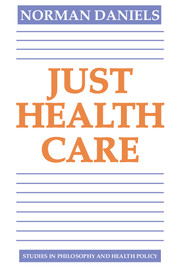Book contents
- Frontmatter
- Contents
- Preface
- Acknowledgements
- 1 Is health care special?
- 2 Health-care needs
- 3 Toward a distributive theory
- 4 Equity of access to health care
- 5 Am I my parents' keeper?
- 6 Doing justice to providers
- 7 Doth OSHA protect too much?
- 8 Risk and opportunity
- 9 Philosophy and public policy
- Works cited
- Index
9 - Philosophy and public policy
Published online by Cambridge University Press: 05 June 2012
- Frontmatter
- Contents
- Preface
- Acknowledgements
- 1 Is health care special?
- 2 Health-care needs
- 3 Toward a distributive theory
- 4 Equity of access to health care
- 5 Am I my parents' keeper?
- 6 Doing justice to providers
- 7 Doth OSHA protect too much?
- 8 Risk and opportunity
- 9 Philosophy and public policy
- Works cited
- Index
Summary
Does justice require funding heart transplants?
I remarked in the Preface that applied philosophy is a risky undertaking. It may leave ‘pure’ philosophers looking for foundations and policy makers up in the air. The utility of the philosophical analyses in this book is probably best judged by others, but I would like to address one question which by now will be on the mind of anyone who looked to this study for moral advice. Does the account developed here help us solve policy problems? Does it help us resolve disputes about the macro questions facing legislators, planners, and the public? My answer, one any Talmudic student would gleefully accept, is, ‘Well, yes and no’. An example might show that this answer really is helpful.
In July 1983, state officials in Massachusetts ruled that Medicaid would fund a heart transplant operation for a state resident. Publicity had helped the person raise many thousands of dollars in charitable donations, but the state guarantee was needed before the transplant could be provided at a medical center in another state. Under great pressure because it had refused the funding, Blue Cross/Blue Shield agreed to fund a heart-lung transplant for another patient as an exception to its regular policy, according to which these transplants are experimental, non-reimburseable procedures. The pressure on government and private third-party payers to provide financing resulted from a recent flurry of life-and-death press dramas involving liver transplants for infants and very young children: here the problem was donor location and not just financing.
- Type
- Chapter
- Information
- Just Health Care , pp. 221 - 230Publisher: Cambridge University PressPrint publication year: 1985



